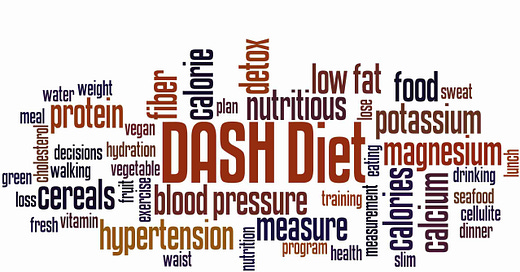DASH Diet vs Mediterranean Diet: Which is Better Long-Term?
Are you trying to eat a healthy diet, or move toward a more plant-based diet, or trying to decrease your sugar or salt? If so you have probably been debating DASH Diet vs Mediterranean Diet.
Have you heard the term “The Standard American Diet” or “SAD” for short? The SAD diet is full of processed foods loaded with sugar and salt, and it's not doing us any favors in the health department.
But fear not! There are brighter, tastier options out there that can pave the way to a healthier, happier you, including the DASH diet and the Mediterranean diet. Let's dive in and uncover the wonders of each!
DASH Diet: A Quick Overview
Ever heard of the DASH diet? DASH diet stands for Dietary Approaches to Stop Hypertension, and boy, does it live up to its name!
Back in the '90s, researchers set out to see how different eating habits could affect blood pressure. Lo and behold, the DASH diet emerged as a superstar in the fight against hypertension (1).
So, what's on the menu with DASH? Let’s check it out!
What Food Can You Eat on the DASH Diet?
Picture a bounty of plant-based goodness including vibrant veggies, juicy fruits, and hearty whole grains. Toss in some low-fat dairy, lean proteins, and a sprinkle of nuts and seeds, and you've got yourself a DASH-approved feast!
With DASH, you'll bid adieu to the salt shaker and embrace the natural flavors of herbs and spices. Plus, you'll steer clear of those sneaky sodium-packed culprits lurking in processed foods. Your heart will thank you!
The DASH diet is an eating plan with the following general guidelines:
Focus on plant-based foods including vegetables, fruits, and whole grains
Fat-free or low-fat dairy products
Fish, poultry, beans, nuts, and vegetable oils
Limit foods that are high in saturated fat, such as fatty meats, full-fat dairy products, and tropical oils such as coconut, palm kernel, and palm oils
Limit sugar-sweetened beverages and sweets
However, there are specific amounts of different foods recommended based on your daily calories. For an average intake of about 2000 calories per day, the following food groups are recommended:
Grains and grain products (7-8 servings per day)
1 slice bread
1 cup of ready-to-eat cereal
½ cup cooked pasta, rice, or cereal
Vegetables (4-5 servings per day)
1 cup raw leafy vegetable
½ cup cooked vegetable
½ cup vegetable juice
Fruit (4-5 servings per day)
1 medium fruit
¼ cup dried fruit
½ cup fresh, frozen or canned fruit
½ cup fruit juice
Low-fat or fat-free dairy foods (2-3 servings per day)
8 ounces of milk
1 cup yogurt
1 ½ ounces of cheese
Lean meats, poultry, fish (6 or fewer servings per day)
1 ounce cooked lean meat, skinless poultry, or fish
1 egg
Nuts, seeds, beans (4-5 servings per week)
1/3 cup nuts
2 tablespoons seeds
2 tablespoons nut butter
½ cup beans
Fats and oils (2-3 servings per day)
1 teaspoon vegetable oil
1 teaspoon soft margarine
1 tablespoon lowfat mayonnaise
2 tablespoons light salad dressing
Sweets (5 or fewer servings per week)
1 tablespoon sugar
1 tablespoon jelly or jam
8 ounces lemonade
½ ounce jelly beans
What Foods Do You Limit on the DASH diet?
The DASH diet also limits sodium (salt) intake. Most Americans get more than 3400 mg/day of sodium compared to the recommended amount of less than 2300 mg/day. Top food sources of sodium in the U.S. according to the Centers for Disease Control and Prevention (CDC) include:
Breads and rolls
Pizza
Sandwiches
Cold cuts and cured meats
Soups
Burritos and tacos
Savory snacks (Chips, popcorn, pretzels, snack mixes, and crackers)
Chicken
Cheese
Eggs and omelets
By following a DASH diet you will naturally be lowering your sodium intake by reducing or eliminating these high sodium foods from your diet.
In addition, read food labels of any pre-packaged foods you eat and aim for less than 5% of the Daily Value (DV) of sodium, use less salt when preparing food (try various herbs and spices instead), and leave the salt shaker off the table.
More details on the serving sizes and quantities of foods at different calorie levels and different sodium levels are available on the website of the National Heart Lung and Blood Institute (NHLBI).
Now you know what to eat on the DASH Diet, so let’s talk about the many benefits.
Benefits of the DASH Diet
Studies have shown that the DASH diet works wonders in slashing blood pressure levels and reducing the risk of heart disease and stroke. But that's not all—this powerhouse eating plan also tackles metabolic syndrome and even gives your brain a boost. Let’s discuss!
Blood Pressure
According to the CDC, nearly half of adults in the US have high blood pressure or are taking blood pressure medication. High blood pressure increases your risk of heart disease and stroke. The DASH diet helps improve heart health by significantly lowering blood pressure (1).
Heart Health
The DASH diet also lowers the risk of heart disease and stroke (2, 3). In addition to its effects on blood pressure, the DASH diet also has positive effects on other risk factors for cardiovascular disease, including cholesterol (4), body weight (5), and risk of diabetes (6).
The high antioxidant content of the DASH diet also helps control inflammation which may contribute to its overall beneficial effects on cardiovascular health (7).
Metabolic Syndrome
Metabolic syndrome (MetS) is a group of risk factors including obesity (especially with weight around the belly), impaired glucose metabolism, elevated blood pressure (BP), and low levels of high-density lipoprotein cholesterol (HDL-c) or other changes in lipid levels (8).
Following the DASH diet appears to reduce the risk of developing MetS (9).
Cancer
The DASH diet also seems to be protective against various types of cancer (10, 11).
Cognitive Health
Because the world population is aging, the number of people with dementia is expected to rise sharply in the coming decades. Diet affects long-term brain health and can play an important role in helping you avoid dementia and its financial and emotional toll.
Following a DASH diet may help maintain brain function (12), although research is mixed and more studies are needed on this topic (13).
Further research originally found that combining aspects of both the Mediterranean and DASH diets has even better effects on cognition (14), though this also needs further confirmation (13).
The MIND diet, which stands for Mediterranean-DASH Intervention for Neurodegenerative Delay focuses on the foods from both the Mediterranean and DASH diets that have shown the best effects on brain health.
Because of its many potential health benefits, the DASH diet is recommended by the American Heart Association (AHA) and the NHLBI as a healthy eating plan.
So that’s the skinny on the DASH diet, now let’s talk about the Mediterranean diet.
Mediterranean Diet: A Taste of the Good Life
Picture yourself lounging in the Mediterranean sunshine, savoring the flavors of fresh fruits, veggies, whole grains, and olive oil.
That's the essence of the Mediterranean diet—an ode to the wholesome goodness found in the traditional diets of countries along the shores of the Mediterranean Sea like Greece, Italy, and Spain.
As early as the 1950s, scientists noticed heart disease was not as common among people living in the Mediterranean region compared to those living in the United States. This led to thousands of research studies over the following years to try to determine why this difference existed.
One part of the difference was determined to be the foods eaten in this region, which was later named the Mediterranean diet.
With the Mediterranean diet, you'll feast on a rainbow of whole foods while bidding farewell to many processed foods that are part of the SAD diet. And let's not forget the occasional glass of red wine to toast to good health!
So you get the general picture, but let’s talk about the specific foods to eat on the Mediterranean diet.
What Foods Do You Eat on a Mediterranean Diet?
This diet, or eating plan, includes lots of fresh fruits and vegetables, whole grains, legumes, nuts, seeds, and healthy fats (such as olive oil). It also includes fish, poultry, eggs, and dairy in moderation, and limited intake of processed foods, red meat, and sweets.
In comparison, a typical American diet is almost exactly the opposite, containing a large amount of highly processed foods, red meat, sweets, and dairy, and very little fruits, vegetables, legumes and whole grains.
There are only specific amounts of a few foods recommended on the Mediterranean diet. In general, it is a way of eating in which:
All meals are based on whole foods, including fruits, vegetables, whole grains, olive oil, beans, nuts, legumes, seeds, herbs and spices
Fish and seafood at least 2 times/week
Poultry, eggs, cheese and yogurt in moderate amounts (1-2 times per week)
Meat and sweets rarely
Water is the main beverage, with wine in moderation
What Foods Do You Limit on the Mediterranean Diet?
Similar to the DASH diet, on the Mediterranean diet you’ll be focussing on whole foods and avoiding highly processed foods which have lots of sugar and salt.
Now you know what to eat on the Mediterranean diet, so let’s talk about the health benefits.
What are the Health Benefits of a Mediterranean Diet?
Studies show that this culinary delight can slash the risk of cardiovascular disease, fend off depression, and even shield your brain from cognitive decline. Plus, it's a delicious way to keep metabolic syndrome at bay and reduce your risk of certain cancers. Let’s review!
Heart Health
According to the CDC, cardiovascular disease is the leading killer of both men and women in the United States. Cardiovascular disease is any disorder of the heart or blood vessels.
Also according to the CDC, major risk factors for cardiovascular disease are high blood pressure, high low-density lipoprotein (LDL) cholesterol, diabetes, smoking and secondhand smoke exposure, obesity, unhealthy diet, and physical inactivity.
The Mediterranean diet has a positive effect on many of these risk factors, including lower blood pressure (15, 16), helping with weight loss (when combined with physical activity) (17, 18), and decreasing risk of developing diabetes (19).
Following a Mediterranean diet can decrease your risk of cardiovascular disease by 25-30% (20, 21, 22, 23).
Mental and Cognitive Health
People who eat a Mediterranean diet are less likely to struggle with depression (24, 25) and are 33% less likely to experience cognitive decline or Alzheimer's (26).
Decreased Risk of Metabolic Syndrome
As described above, Metabolic Syndrome (MetS) is a combination of risk factors including central obesity, dyslipidemia, impaired glucose metabolism, elevated blood pressure, and low levels of high-density lipoprotein cholesterol (HDL-c) (8).
Following a Mediterranean diet can decrease your risk of developing MetS and many of the risk factors for MetS (27).
Other Disease
Following a Mediterranean diet may reduce your risk of cancer (23, 28). It may also decrease your risk of developing Parkinson’s disease by 25% compared with a standard American diet (29).
The Mediterranean diet can help you maintain lean body mass and bone density as you age, and manage your weight. This can be especially important for women as they get older.
The Mediterranean diet is generally easy to follow and most people can maintain it long-term (18). It is recommended by the USDA and the American Heart Association as a healthful eating pattern.
If you opt to follow a Mediterranean diet, you still need to watch your portions and be physically active. It’s not only the foods, but also the healthy lifestyle that seems to be beneficial.
The Verdict: Which Diet Reigns Supreme?
Both the DASH and the Mediterranean Diet eating patterns help lower your risk for heart disease and other chronic diseases and lead to better health.
In addition, both dietary patterns are backed by years of scientific research and approved by health agencies and scientific organizations such as the American Heart Association and the Mayo Clinic, among many others.
If you are mainly concerned about hypertension and heart disease, the DASH diet is for you. If you are looking for more general health benefits, or brain health protection, the Mediterranean diet may be best.
However, because they both have great benefits, you can feel free to choose the one that fits your lifestyle - the best diet is going to be the one that you can stick with long-term!







